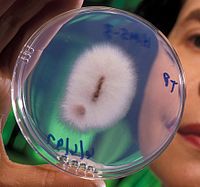
Photo from wikipedia
Phaseolus vulgaris is a legume indigenous to America which is currently cultivated in Europe including countries located at the Southeast of this continent, such as Croatia, where several local landraces… Click to show full abstract
Phaseolus vulgaris is a legume indigenous to America which is currently cultivated in Europe including countries located at the Southeast of this continent, such as Croatia, where several local landraces are cultivated, most of them of Andean origin. In this work we identify at species and symbiovar levels several fast-growing strains able to form effective symbiosis with P. vulgaris in different Croatian soils. The identification at species level based on MALDI-TOF MS and core gene sequence analysis showed that most of these strains belong to the species R. leguminosarum, R. hidalgonense and R. pisi. In addition, several strains belong to putative new species phylogenetically close to R. ecuadorense and R. sophoriradicis. All Croatian strains belong to the symbiovar phaseoli and harbour the α and γ nodC alleles typical for American strains of this symbiovar. Nevertheless, most of Croatian strains harboured the γ nodC gene allele supporting its Andean origin since it is also dominant in other European countries, where Andean cultivars of P. vulgaris are traditionally cultivated, as occurs in Spain. The only strains harbouring the α nodC allele belong to R. hidalgonense and R. pisi, this last only containing the symbiovars viciae and trifolii to date. This is the first report about the presence in Europe of the species R. hidalgonense, the nodulation of P. vulgaris by R. pisi and the existence of the symbiovar phaseoli within this species. These results significantly increase the knowledge of the biogeography of Rhizobium-P. vulgaris symbiosis.
Journal Title: Systematic and applied microbiology
Year Published: 2019
Link to full text (if available)
Share on Social Media: Sign Up to like & get
recommendations!